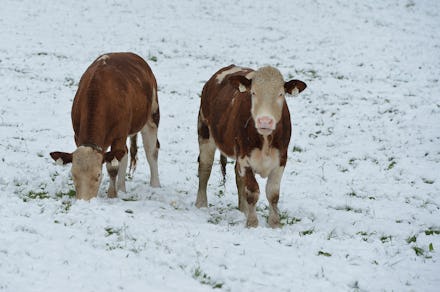The Unsuspected Cause Of Thousands Of Cattle Deaths in South Dakota

While much of the country enjoyed the opening stretch of autumn with a surprising and unseasonably pleasant patch of great weather at the start of October, South Dakota experienced winter storm Atlas. Atlas was a freak storm that took everyone in its path by surprise, most devastatingly the cattle ranchers whose herds were out to pasture at the time.
Over the course of several days, winter storm Atlas dropped record-setting amounts of snow across South Dakota, and for the state's cattle ranchers, this early blizzard resulted in the loss of tens of thousands of cattle.
Normally, cows intended for meat production, such as those lost in South Dakota, remain on the pasture year-round and can handle the blistering winter conditions. At this time of year, however, the cows have not yet grown their winter coats, so their exposure to some 60 hours of intense rain, snow, and winds was more than they could bear.
In the aftermath of Atlas, ranchers have begun to take stock of their herds, count their losses, and clean up the resulting mess. Raising cattle is an expensive business and the loss of even one mature cow, which can bring in as much as $1,800, will be sorely felt. The bodies of dead cattle dot the landscape far and wide, and in order to see what remains of their herds and protect the remaining cattle from the spread of disease, ranchers must remove the bodies as quickly as possible. This is all the more heart wrenching as many ranchers have reported losses of up to half their livestock, including the animals that would have produced next year's calves.
To top off the situation, due to governmental delays and the shutdown itself, ranchers are unable to receive assistance. They are unable to properly document their losses, and cannot consult the Farm Service Agency because workers there are on furlough. With million-dollar losses, the destruction of a large percentage of their herds, and the loss of next year's animals, South Dakota's cattle industry has been hit hard and left with few options.
It's a sad state of affairs in South Dakota.